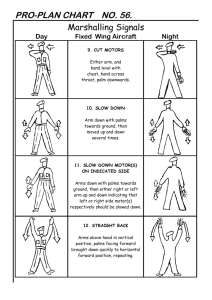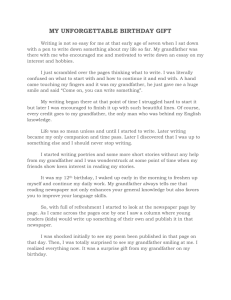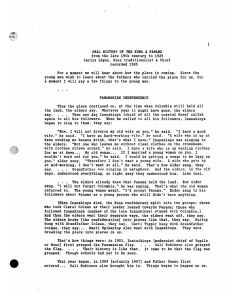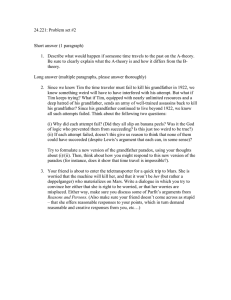Document 13489649
advertisement
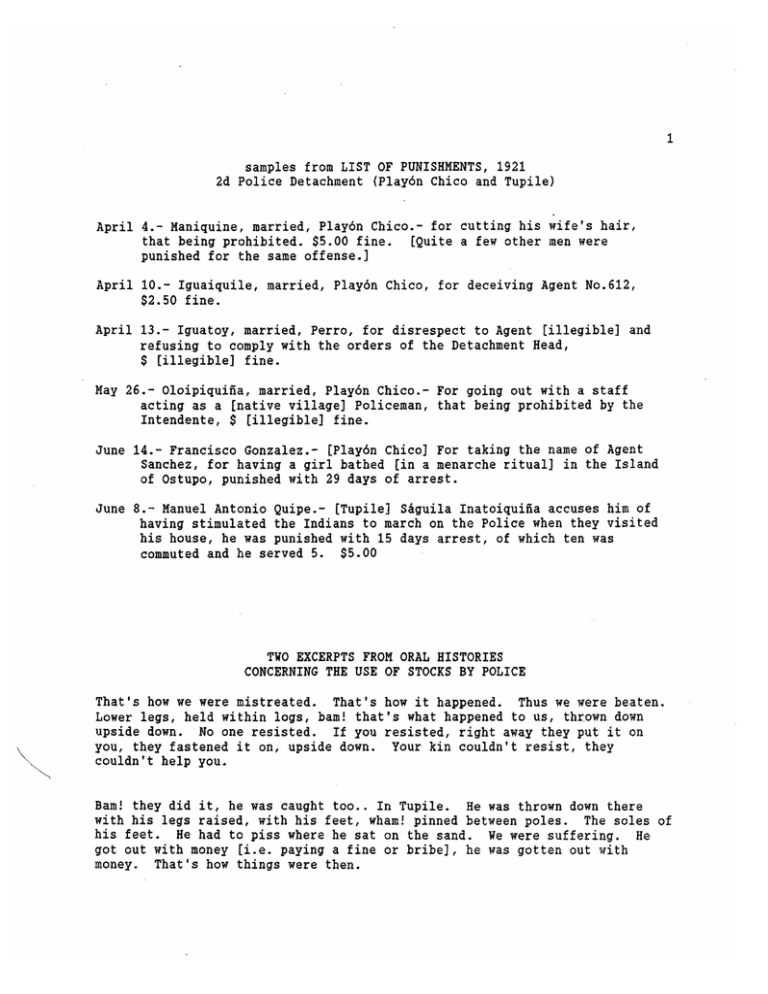
1 samples from LIST OF PUNISHMENTS, 1921 2d Police Detachment (Play6n Chico and Tupile) April 4.- Maniquine, married, Play6n Chico.- for cutting his wife's hair, [Quite a few other men were that being prohibited. $5.00 fine. punished for the same offense.] April 10.- Iguaiquile, married, Play6n Chico, for deceiving Agent No.612, $2.50 fine. April 13.- Iguatoy, married, Perro, for disrespect to Agent [illegible] and refusing to comply with the orders of the Detachment Head, $ [illegible] fine. May 26.- Oloipiquifia, married, Play6n Chico.- For going out with a staff acting as a [native village] Policeman, that being prohibited by the Intendente, $ [illegible] fine. June 14.- Francisco Gonzalez.- [Play6n Chico] For taking the name of Agent Sanchez, for having a girl bathed [in a menarche ritual] in the Island of Ostupo, punished with 29 days of arrest. June 8.- Manuel Antonio Quipe.- [Tupilel Sguila Inatoiquifa accuses him of having stimulated the Indians to march on the Police when they visited his house, he was punished with 15 days arrest, of which ten was commuted and he served 5. $5.00 TWO EXCERPTS FROM ORAL HISTORIES CONCERNING THE USE OF STOCKS BY POLICE That's how we were mistreated. That's how it happened. Thus we were beaten. Lower legs, held within logs, bam! that's what happened to us, thrown down upside down. No one resisted. If you resisted, right away they put it on you, they fastened it on, upside down. Your kin couldn't resist, they couldn't help you. Bam! they did it, he was caught too.. In Tupile. He was thrown down there with his legs raised, with his feet, wham! pinned between poles. The soles of his feet. He had to piss where he sat on the sand. We were suffering. He got out with money [i.e. paying a fine or bribe], he was gotten out with money. That's how things were then. _ _____ I �II� _ ii 1 ORAL TESTIMONY CONCERNING THE PACIFICATION OF ONE ISLAND, TUPILE My uncle, on the other hand, my eldest uncle, as for him, he didn't Then the become a policeman. I saw that he resisted becoming their follower. young people began to be working with them, they joined with the police, So then a that's what I saw. [The police] increased in numbers on us... house was really built; a barracks was built. Then, I was a witness, for the first time a teacher, a single woman, came here, a young woman, a woman they called Guillermina, they called her. The woman came to stay, she would become the teacher. Then some entered [the school]. Then with that they really began to increase in numbers. Then, while it was happening like that, the police were increasing, the police were growing and growing on us/them. It was like that, and things had gone on for a while,... then the one who would be their leader arrived too, to be chief of police. Gord6n they called him. I saw him arrive. A good-looking waga, a white waga. He came here. Gord6n, he... he came to stay here, now, in He was the one who came to stay. Tupile. To lead his followers. He came to stay, and then they felled the coconut palms. At the point stood all the elder's palms. Then things were finished. Then they began to now, the Sports Club, the players, fell the palms. Then what's their name.. their building, their baskets, then they were put up there. That's what they began felling the palms for. Well they felled a big grove of coconut palms. Palms wiped out! Over that way towards the point was where they felled them. The elders' coconuts were gone. At that time, Oloelikinya and all, their palms stood there, those were felled. Another of their owners lived over here, you see. Ikwatiokinya, they called him. His palms were there too. Coconut palms wiped out! What could their owners say? Who could cry out against it? Well if you called out, you'd come to grief. The elders had been Something good had ended. I was observing the elders. Then, despoiled. little by little, all the coconut palms were destroyed, every last one, The palms disappeared... finished off! The waga didn't want the place looking bad. They wanted a good place, with everything neatly in row after row, that's what things were happening that way. "These coconut palms are just spoiling the place. Cut down the palms. Put things in rows one after the other," the waga said. The elders did what they were told. The place was being remade that way, the wide streets were being laid out. According to what friend Gord6n said. Gordon got mad easily. If people didn't do what he said, he'd get mad. I saw that he wanted things his way. The elders couldn't say anything. The elders couldn't get angry. Who could answer back? The wagas are brutal, we said. The wagas were always angry. I saw they we were living like that. In truth, we were in a bad way. The elders all accepted his ideas. I witnessed the dancing begin, I saw them establish a club. I was living there, and I was already pretty good-sized. �1_1� �II_ _�I I__I �I� � 2 Then the people were really being severely punished. People couldn't, the two of them, now if you were sitting on the front porch like this, you couldn't, if you were sitting and talking to each other, your friend and you, about where your friend had been, what you had done in the forest, sitting asking each other---you couldn't do that, that's what happened. Someone was listening behind your back. There were still many on [the wagas'] side, who would repeat what you said, who would willfully distort it, someone who was mad at you. Someone who didn't like you would have a lot to say about you. The young women, they went that way too. And the older women, they went with [the wagas] even more. In their hearts. So they would spy on you. In that situation I saw my grandfather: I was there when my grandfather was punished. I really saw it, I was already pretty big. There was a man they called, that elder, they called him Inasoba. They were always visiting each other. Another elder lived nearby too, his close friend. Now that elder they called Gustoro, they called him that. They were great buddies. When they returned from having been off-island, they'd come to each other, and they'd sit chatting, about things, talking about their planting, talking about the things they'd gone to do---they'd come together like that. Then I witnessed it when grandfather ended up being punished, for sitting and doing those things. You'd see, right away the police, well they'd turn up, standing there. "What are you talking about?" they'd say. "What are you mentioning? Who are you talking about?" they'd come say. Grandfather, uh the elders would say, "Nothing, we're just chatting about nothing in particular. About how I went to work in the forest, how I went to get things for my children, went to plant crops, about where I might go, I'll go get fish offshore, or I'll go get fish by the coast, thus I went to do things, I've been telling him all about that as we talk. I have nothing to do with talking about other people," the elders would say. "Why would I be talking about others at all? We're only talking about how we've been providing for our children." When he/they had spoken to the waga like that, the waga wouldn't say anything but "No. You are being all angry at me. You are being all angry at us," he said to them. "you're talking about us, people have told us that you hate us. 'Those men have been angry. He [has been] to Ailigandi. What notions might you have heard there; 'Those Indians keep crossing to Ailigandi. "Not so," they said to him. Well I visit there. After all, it's my home. Since it's my home, I often go see my kin," he said to him. If they said that to him, the elders would end up arrested. "No, no talking. Come on. We'll go hear this matter, hear what the elders will say. Well as for you, there's just one with you. I saw him dragged off, to the barracks. Te. That's how it was then. Then they'd disappear. The elders, swata! They wouldn't let them talk at all. "Well they were deceitfully telling me lies. 'We weren't being angry,' they falsely claimed," the waga said. "Put'em away." Sometimes they'd have to sit there for a week. For a week they'd be lost to the world. _____l_____l_____C_/PI___I 3 Then my grandfather would come home again. "You're out again." Well they'd always been close friends, so well how could you forget each other? They'd come home from off-island, and they'd go see each other. So because they would always do that, being arrested got to be a regular thing. They wouldn't be out for very long, and you'd see that they'd be dragged off again. They would try their case again. "Such and such was also said about you." Right, I uh, then one last time, my grandfather really went away, he was taken off to Porvenir [government headquarters for San Blas]. He and Gustoro. His friend Gustoro and he were arrested a lot. Off they'd go! Grandfather was gone six months, in Porvenir. Tossed in the calaboose. I was there when grandfather came home again. Oh my, his clothes were dirty, his clothes were in tatters! He came back home again. That's what happened to grandfather. Well now, grandfather didn't give a damn. He came back. He came back. That's really what happened. So sometimes, uh, there was a place they called Kwipkanti. My grandfather would go there to collect things, his crops were there---his coconut was there, his bananas were there---getting medicine too. Then he'd really see, in the early morning, at dawn, getting bananas there, then people from here [i.e. from Ailigandi] would sit waiting for him. A message had truly been brought. The sad state of things began to be heard. Then those from here [Ailigandi] learned the news, he would say to the people from here: "Sometimes the waga, day, uh, 'This week we will go to Ailigandi. We'll go hear matters out. We'll go see Colman. We have to go see just how strong he is. We have to stand up to him," the waga said. "The question will be heard out." Having heard that, he was passing on the news to the people from here, in the forest. My grandfather and all, Ina soba and all. "This is what the waga has been saying. In four days. The waga says, "We'll go in four days, we'll proceed then. We'll cross over there..." I____��___I___I1__I____IP____________� I�L_�I
